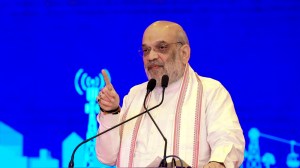UCC risks erasing cultural identity of Gujarat communities: PUCL writes to panel chairperson
Citing the “widely varied” geographical and cultural landscape of Gujarat, the letter states that the implementation of UCC could create legal alienation and deepen social tensions
 The letter also states that UCC is against Dr BR Ambedkar’s vision of caste annihilation as Ambedkar also advocated for “voluntary adoption” of uniform law and “not an imposed one” (Express Photo)
The letter also states that UCC is against Dr BR Ambedkar’s vision of caste annihilation as Ambedkar also advocated for “voluntary adoption” of uniform law and “not an imposed one” (Express Photo)Raising concerns regarding the proposed Uniform Civil Code (UCC), the Gujarat unit of the People’s Union for Civil Liberties (PUCL) Saturday wrote a letter addressed to Retired Justice Ranjana Prakash Desai — Chairperson of the Gujarat UCC Committee — citing “lack of transparency” and “risks erasing cultural identities” of the communities in the state.
Signed by Gujarat PUCL President Anand Yagnik and General Secretary Mujahid Nafees, the letter raises the issue of the cultural and religious diversity of Gujarat being “homogenized” under the UCC. The letter states, “Gujarat has rich cultural and religious diversity and is well known in the country and world. The state’s demographic composition — predominantly Hindu (88.57%), with a significant Muslim minority (9.67%), other micro minorities viz Jains (0.96%), Christians (0.52%), Sikhs (0.10%), Parsis (0.02%); and the Adivasis (14.75%) — reflects a deep plurality of traditions, customs and legal practices that cannot be homogenized under a single code.”
The letter states that “customary laws” are followed by various communities in the state, including nomadic and denotified tribes.
The letter states, “Hindu communities like Patidars, Kolis, and Dalits, alongside Muslim groups such as the Shias and Sunnis, have long followed unique customs in marriage, inheritance, and religious observances. Gujarat’s tribals, including Bhils and Gamits, follow customary laws that govern social and familial structures, distinct from mainstream legal frameworks. The Jains and Christians also have specific religious and legal traditions that shape their identities.” “Many NTDNT (Nomadic and Denotified Tribes) communities follow oral traditions and customary dispute resolution mechanisms that are deeply rooted in their social structures. Their marriage customs often differ from mainstream legal frameworks, allowing for community-specific arrangements that respect individual choices,” states the letter.
Citing the “widely varied” geographical and cultural landscape of Gujarat, the letter states that the implementation of UCC could create legal alienation and deepen social tensions. “Geographically, the cultural landscape of Gujarat varies widely — from the tribal traditions in Dang to the coastal heritage of Kharwas and the pastoral lifestyles of Rabaris in Saurashtra. Imposing a uniform code disregards these diverse lived realities and threatens the autonomy of communities in maintaining their heritage. A UCC, rather than emphasizing equality, risks erasing cultural identities, creating legal alienation, and deepening social tensions,” it states.
The letter also states that UCC is against Dr BR Ambedkar’s vision of caste annihilation as Ambedkar also advocated for “voluntary adoption” of uniform law and “not an imposed one”. The letter also raises concern over the UCC draft not having been shared for a public review and states that it “does not guarantee equality”. The letter states that it can “lead to majoritarian dominance” and “suppress the rights of minority communities”.








